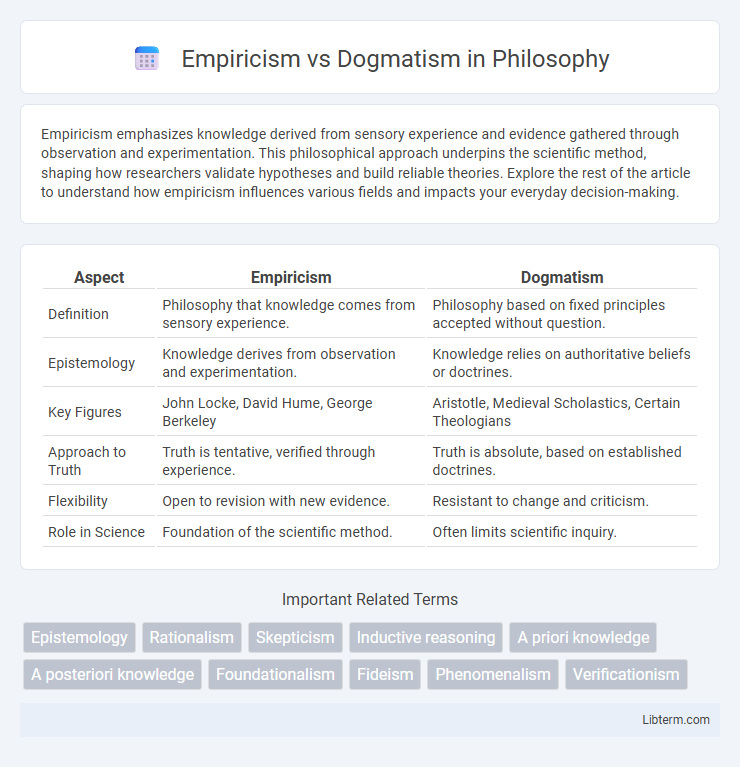Empiricism emphasizes knowledge derived from sensory experience and evidence gathered through observation and experimentation. This philosophical approach underpins the scientific method, shaping how researchers validate hypotheses and build reliable theories. Explore the rest of the article to understand how empiricism influences various fields and impacts your everyday decision-making.
Table of Comparison
| Aspect | Empiricism | Dogmatism |
|---|---|---|
| Definition | Philosophy that knowledge comes from sensory experience. | Philosophy based on fixed principles accepted without question. |
| Epistemology | Knowledge derives from observation and experimentation. | Knowledge relies on authoritative beliefs or doctrines. |
| Key Figures | John Locke, David Hume, George Berkeley | Aristotle, Medieval Scholastics, Certain Theologians |
| Approach to Truth | Truth is tentative, verified through experience. | Truth is absolute, based on established doctrines. |
| Flexibility | Open to revision with new evidence. | Resistant to change and criticism. |
| Role in Science | Foundation of the scientific method. | Often limits scientific inquiry. |
Introduction to Empiricism and Dogmatism
Empiricism emphasizes knowledge derived from sensory experience and evidence, asserting that observation and experimentation form the foundation of understanding. Dogmatism relies on established beliefs or doctrines accepted without question, often resisting new evidence or critical analysis. The contrast highlights empiricism's commitment to inquiry and revision versus dogmatism's adherence to fixed principles.
Defining Empiricism: Foundation and Principles
Empiricism is a philosophical doctrine emphasizing knowledge derived from sensory experience and observation as its foundation. Core principles include the reliance on evidence, experimentation, and inductive reasoning to form beliefs and hypotheses. This approach contrasts with dogmatism, which asserts knowledge based on established authority or unquestioned premises without requiring empirical validation.
Understanding Dogmatism: Core Beliefs and Characteristics
Dogmatism centers on holding firm, unquestioned beliefs that resist change regardless of contrary evidence or new information. Core characteristics include an unwavering commitment to specific doctrines, skepticism towards alternative perspectives, and a reliance on authoritative sources rather than empirical proof. This rigidity often leads to intellectual inflexibility, impeding critical thinking and the evolution of knowledge.
Historical Development of Empiricism
Empiricism emerged prominently during the 17th century, spearheaded by philosophers such as John Locke, George Berkeley, and David Hume, who emphasized sensory experience as the foundation of knowledge. This historical development marked a shift from medieval scholastic traditions and dogmatism, which relied heavily on unquestioned beliefs or authorities. The empirical method fostered the growth of modern science by promoting observation, experimentation, and evidence-based reasoning as essential tools for acquiring reliable knowledge.
Historical Evolution of Dogmatism
Dogmatism, rooted in ancient Greek philosophy, evolved as a rigid adherence to established doctrines, contrasting sharply with the empirical emphasis on observation and evidence. Throughout history, dogmatism often manifested in religious and scientific institutions, resisting change and suppressing alternative viewpoints. The Enlightenment era challenged this rigidity by promoting empirical methodologies, ultimately diminishing dogmatism's dominance in intellectual discourse.
Key Philosophers: Empiricists vs Dogmatists
Empiricism, championed by philosophers like John Locke, David Hume, and George Berkeley, emphasizes knowledge derived from sensory experience and empirical evidence. Dogmatism, represented by figures such as Rene Descartes and Baruch Spinoza, asserts that certain foundational principles or innate ideas can be known with certainty without reliance on sensory input. The debate between these key philosophers centers on the source and justification of knowledge, influencing epistemology and the scientific method.
Methods of Knowledge Acquisition: Observation vs Authority
Empiricism emphasizes acquiring knowledge through systematic observation, experimentation, and sensory experience, valuing evidence derived from the natural world. Dogmatism relies heavily on authority, tradition, and established beliefs, often accepting knowledge without questioning or requiring empirical validation. Methods of knowledge acquisition in empiricism prioritize iterative testing and verification, while dogmatism depends on authoritative assertions as the primary source of truth.
Impact on Science and Society
Empiricism, emphasizing observation and experimentation, drives scientific progress by fostering evidence-based knowledge and technological innovation. Dogmatism, relying on fixed beliefs without critical examination, can hinder scientific advancement and limit societal openness to new ideas. The clash between empiricism and dogmatism shapes cultural attitudes towards education, policy-making, and critical thinking, directly influencing scientific literacy and societal development.
Contemporary Debates: Relevance in Modern Thought
Contemporary debates on empiricism versus dogmatism emphasize the ongoing tension between evidence-based inquiry and rigid adherence to established beliefs. Empiricism's reliance on observation and experimentation remains crucial in scientific advancements, while dogmatism poses challenges by resisting change and critical scrutiny. The relevance of this debate persists as knowledge systems evolve, highlighting the necessity for balancing open-minded skepticism with foundational principles in modern thought.
Conclusion: Bridging Empiricism and Dogmatism
Bridging empiricism and dogmatism involves integrating empirical evidence with foundational beliefs to foster a balanced approach to knowledge acquisition. Embracing empirical methods ensures reliance on observable data, while critical dogmatism provides a structured framework to interpret findings within consistent principles. This synthesis enhances epistemic growth by promoting open inquiry without abandoning core convictions.
Empiricism Infographic

 libterm.com
libterm.com